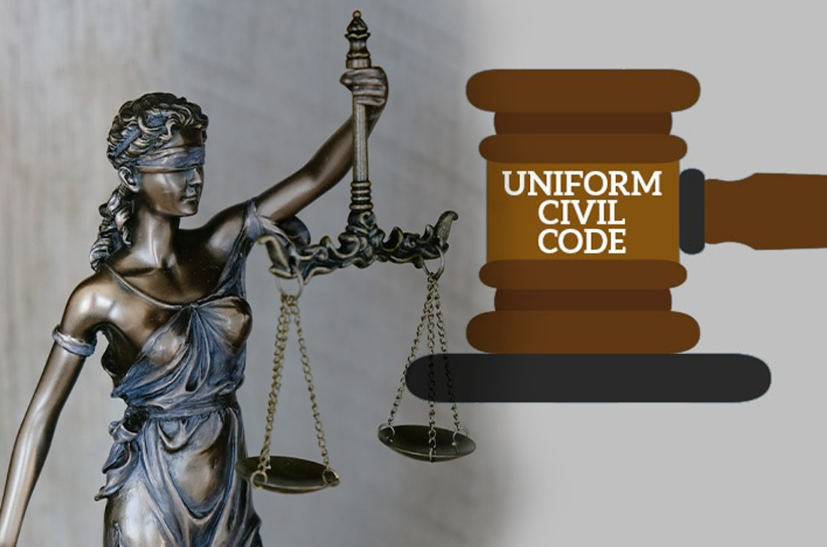Uniform Civil Code (GS Paper 2, Governance)

Introduction
- On August 15, 2024, in his 11th Independence Day speech, Prime Minister Narendra Modi advocated for the implementation of a Uniform Civil Code (UCC), referring to it as a "Secular Civil Code."
- This call for reform highlights a broader debate about the need for a singular set of personal laws applicable to all citizens, regardless of their religious affiliations.
- This article delves into the concept of the UCC, its constitutional backing, current implementation, arguments for and against it, and the potential way forward.
What is the Uniform Civil Code?
- A Uniform Civil Code (UCC) refers to a unified set of laws governing personal matters such as marriage, divorce, inheritance, and adoption across all religious communities in a country.
- Presently, India has distinct personal laws for different religious groups, which means that laws vary based on one's religion.
- In India, the concept of UCC envisions a single civil code applicable to everyone, which contrasts sharply with the current system where personal laws differ based on religious identity.
Constitutional Provisions
- The idea of a UCC is enshrined in Article 44 of the Indian Constitution, located in Part IV, which outlines the Directive Principles of State Policy.
- Article 44 states that the State "shall endeavor to secure for the citizens a uniform civil code throughout the territory of India."
- Although Directive Principles are not justiciable, they are fundamental in guiding the State’s governance and policy-making.
The UCC in India: Current Status
- Goa is often cited as a model for the UCC in India.
- The state follows the Portuguese Civil Code of 1867, which applies uniformly to all citizens regardless of their religion.
- This code covers various personal matters, including marriage, divorce, and succession, providing a practical example of a functioning UCC in India.
- Despite this, other states like Gujarat, Madhya Pradesh, and Assam have shown interest in adopting a UCC, but no state has officially enacted one yet.
- The challenges in implementing a nationwide UCC stem from India's vast cultural and religious diversity.
-
Arguments in Favor of the UCC
- Uniformity in Governance: A UCC would streamline administrative processes and governance, making the legal system more efficient and equitable for all citizens.
- Women's Rights: Different religious personal laws often contain discriminatory provisions against women. A uniform code could ensure equal rights and protections, promoting gender equality.
- Secularism: A UCC would reinforce India's secular fabric by treating all citizens equally, regardless of their religious affiliations, thus supporting the principle of secularism enshrined in the Constitution.
- International Image: Adopting a UCC may bolster India’s international reputation as a nation committed to equality and human rights.
- National Integration: Implementing a UCC could enhance national unity by establishing a shared legal framework for all communities, fostering a sense of collective identity.
Arguments Against the UCC
- Plurality in Laws: Critics argue that India's diverse personal laws reflect the country’s pluralistic society. Imposing a single set of laws might undermine this diversity and fail to address the unique needs of different communities.
- Implementation Challenges: The practical difficulties of implementing a UCC are significant, given the varied customs and practices across India's religious and tribal communities.
- Cultural and Religious Concerns: There is apprehension that a UCC could infringe upon traditional practices and rituals of minority communities, potentially leading to resistance and unrest.
- Constitutional Concerns: Some argue that a UCC might infringe upon constitutional rights guaranteed under Articles 25 and 26, which protect the freedom to practice and propagate one’s religion.
- Minority Fears: There is a concern that a UCC could be influenced by majority Hindu practices, marginalizing minority communities and their traditions.
- Law Commission's Stance: The Law Commission of India has suggested that a UCC is "neither necessary nor desirable at this stage." It advocates for addressing discriminatory practices within specific personal laws rather than imposing a uniform code.
Way Ahead
- To move forward with the UCC, it is crucial for authorities to engage in extensive consultations with various stakeholders, including religious and cultural groups, to ensure that the process is inclusive and respectful of diverse perspectives.
- Building consensus and fostering transparency will be key to developing a UCC that is equitable and sensitive to India’s pluralistic society.
- The Law Commission’s emphasis on "equality within communities" rather than "equality between communities" suggests that reforms should focus on addressing internal disparities within each community’s personal laws before striving for a uniform code.
Conclusion
- The Uniform Civil Code remains a contentious and complex issue in Indian politics and law.
- While the vision of a single set of personal laws for all citizens aligns with the principles of equality and secularism, the practical challenges and cultural sensitivities involved require careful consideration and a nuanced approach.
- Moving forward, dialogue and deliberation will be essential in shaping a framework that respects India's rich diversity while promoting justice and equality for all.


